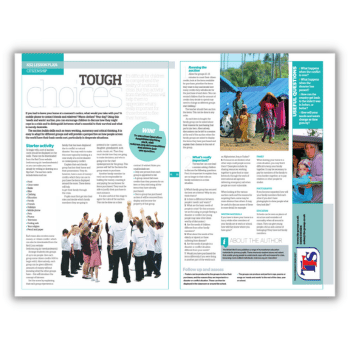This refugee lesson plan from the Red Cross, perfect for Refugee Week, will help pupils to appreciate what’s really important for those forced to flee their homes…
If you had to leave your home at a moment’s notice, what would you take with you? A mobile phone to contact friends and relatives? Warm clothes? Your dog?
Using this ‘needs and wants’ auction, you can encourage children to discuss how they might cope in a crisis and to distinguish between what’s essential to their survival and what is merely desirable.
The auction builds skills such as teamwork, numeracy and critical thinking. It is easy to adapt for different groups and will provide a perspective on how people across the world have their basic needs met, particularly in desperate situations.
Refugee lesson starter activity
To begin with, create a set of auction cards to display on the wall. These should include items such as:
- Food
- Clean water
- Radio
- Bike
- Clothing
- Education
- Family
- Friends
- Holidays
- Mobile phone
- Pets
- Photos
- Television
- Feeling safe
- Your religion
- Pencil and paper
Each team also receives some money, or ‘citizen credits’. Arrange students into groups of up to six people. Give each group some citizen credits (400 to begin with).
Alternatively, each group can be given different amounts of money without knowing what the other groups have – this will introduce the concept of fairness.
Set the scene by explaining that each group represents a family that has been displaced due to conflict or natural disaster.
You may wish to make this more topical by looking at a case study of a recent disaster or contemporary conflict.
Starting the auction
Explain that each family group has lost their home and their possessions. They do, however, have a sum of money/credits, which they can use to purchase the items displayed around the room.
These items will help to get their family through the crisis. Pupils must first get into their roles and decide which family members they are going to pretend to be – parent, son, daughter, grandparent, aunt, uncle, cousin, etc.
Then they must decide how they are going to make decisions, and who is going to be the chief spokesperson for the group.
This person will ‘bid’ for the items the group wants to purchase. Another family member (or two) can be responsible for holding the money, counting it and paying the auctioneer for items purchased.
They must be able to justify their purchase in each instance. It is also useful at this stage to agree the rules of the auction. This can be done as a class contract if wished.
Rules you could include are:
- Only one person from each group is appointed to bid.
- A group cannot bid more credits than they possess for an item or they risk losing all the items they have already purchased.
- Once a group has purchased an item it will be removed from display and become the property of that group.
The British Red Cross publishes a range of humanitarian education materials for primary pupils. These resources explore issues and values that enable young people to understand, cope with and respond to crisis, becoming more resilient individuals.














